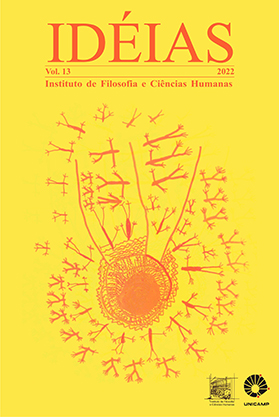Resumo
Como aprofundar as tecnologias de inteligência artificial (IA) no sentido de lhe conferir mais maturidade? Como produzir um conhecimento mais completo, robusto e rigoroso que nos ajude a encontrar seu sentido ético? Este artigo é um esforço inicial de enfrentar tais questões por meio da noção de “tecnologia aprofundada” de Gilbert Simondon (2014) em diálogo com análises recentes feitas no campo dos estudos críticos sobre IA que caminham na direção de investigar os fundamentos epistêmicos e de funcionamento da tecnologia e de propor formas não autocráticas de conceber e fazer funcionar sistemas de IA.
Referências
ANDERS, G. L’obsolescence de l’Homme. 1 Ed. Paris: Editions Ivrea, 2001.
BARDIN, A. Epistemology and Political Philosophy in Gilbert Simondon: Individuation, Technics, Social Systems. London: Springer, 2015.
BENJAMIN, R. Race after technology: Abolitionist tools for the new Jim code. New York: Polity, 2019.
BUCKMINSTER-FULLER, R. Critical Path. 1 Ed. New York: St. Martin's Press, 1981.
CHARBONNIER, S. Présentation de l’article de Gilbert Simondon. Recherches en didactiques, vol. 23, no. 1, 2017, pp. 133-141.
COMBES, M. Simondon Individu et Collectivité: pour une philosophie du transindividuel. Paris: PUF, 1999.
CRAWFORD, K. Atlas of AI. New Haven: Yale University Press, 2021.
CRAWFORD, K; JOLER, V. Anatomy of an AI system. Anatomy of AI, 2018. Disponível em: https://anatomyof.ai/. Acesso em: 14 fev. 2022.
DRYER, T. Designing Certainty The Rise of Algorithmic Computing in an Age of Anxiety 1920-1970. Tese (doutorado). Universidade da Califórnia, San Diego, 2019. Disponível em: https://escholarship.org/uc/item/4d02g6x3. Acesso em: 14 fev. 2022.
FREIRE, E. 2018. 'Faltam-nos poetas técnicos': em direção a uma formação tecnoestética. In. FREIRE, E; VERONA, J A; SOARES, S (Orgs.). Educação Profissional e Tecnológica. 1 Ed. São Paulo: Paco Editorial, 2018. pp. 21-40.
HAYWARD, M; GEOGHEGAN, B D. Introduction: Catching up with Simondon. SubStance, vol. 41, n. 3, Issue 129: Gilbert Simondon, 2012, p. 3-15.
HUI, Y. Tecnodiversidade. São Paulo: Ubu Editora, 2020.
ITS RIO. Planos estratégicos de desenvolvimento de Inteligência Artificial. Portal ITS Rio, 2020. Disponível em: https://itsrio.org/wp-content/uploads/2020/03/RelatorioAI.pdf. Acesso em: 14 fev. 2022.
ITO, J. Resisting Reduction: A Manifesto. Journal of Design and Science, 2017. Disponível em: https://doi.org/10.21428/8f7503e4. Acesso em: 14 fev. 2022.
KUBRICK, S. 2001: a space odyssey. USA | UK, 1968, 142 min. (ficção científica).
LE GUIN, U. K. The Carrier Bag Theory of Fiction. Londres: Ignota Books, 2019.
LEWIS, J E; ARISTA, N; PECHAWIS, A; KITE, S. Making Kin with the Machines. In. VICKERS, B; ALLADO-MCDOWELL, K (Eds.). Atlas of Anomalous AI. Londres, Ignota Books, 2020, p. 40-51.
LEWIS, J E; ABDILLA, A; ARISTA, N; BAKER, K; BENESIINAABANDAN, S; BROWN, M; CHEUNG, M; COLEMAN, M; CORDES, A; DAVISON, J; DUNCAN, K; GARZON, S; HARRELL, D F; JONES, P ; KEALIIKANAKAOLEOHAILILANI, K; KELLEHER, M; KITE, S; LAGON, O; LEIGH, J; LEVESQUE, M; MAHELONA, K; MOSES, C; NAHUEWAI, I; NOE, K; OLSON, D; PARKER JONES, O; RUNNING WOLF, C; RUNNING WOLF, M; SILVA, M; FRAGNITO, S; WHAANGA, H. Indigenous Protocol and Artificial Intelligence: position paper. Concordia University Research Repository, 2020b. Disponível em: https://spectrum.library.concordia.ca/id/eprint/986506/ Acesso em: 14 fev. 2022.
OCHIGAME, R. The invention of “Ethical IA”. The Intercept, 2019. Disponível em: https://theintercept.com/2019/12/20/mit-ethical-ai-artificial-intelligence/ Acesso em: 14 fev. 2022.
O'NEIL, C. Weapons of Math Destruction: how big data increases inequality and threatens democracy. New York: Broadway Books, 2016.
PASQUINELLI, M. How a Machine Learns and Fails: A Grammar of Error for Artificial Intelligence”. Spheres, n. 5, 2019. Disponível em: https://spheres-journal.org/contribution/how-a-machine-learns-and-fails-a-grammar-of-error-for-artificial-intelligence/. Acesso em: 14 fev. 2022.
PASQUINELLI, M.; JOLER, V. The Nooscope manifested: artificial intelligence as instrument of knowledge extractivism. AI & SOCIETY, v. 36, n. 4, p. 1263–1280, 2021.
RADU, R. Steering the governance of artificial intelligence: national strategies in perspective. Policy and Society, v. 40, n. 2, p. 178-193, 2021.
RODRÍGUEZ, P. Enciclopedismo, tecnología y educación: El nuevo estadio de la cultura según Gilbert Simondon. Revista Q, v. 10, n. 20, p. 5-23, 2016.
ROUVROY, A.; BERNS, T. Governamentalidade algorítmica e perspectivas de emancipação: o díspar como condição de individuação pela relação? Revista ECO-Pós, v. 18, n. 2, p. 36–56, 2015.
SIMONDON, G. Place d’une initiation technique dans une formation humaine complète. In. Sur la Technique. Paris: PUF, 2014, pp. 203-224.
SIMONDON, G. Trois perspectives pour une réflexion sur l'éthique et la technique. In. Sur la Technique. Paris: PUF, 2014, pp. 337-354.
SIMONDON, G; PARENT, J; LE MOINE, J. Entrevista sobre a mecanologia. Mimeo. v. 1, n. 1, p. 04-42 , 2019. Disponível em: https://portais.univasf.edu.br/antropologia/mimeo. Acesso em: 14 fev. 2022.
SIMONDON, G. Do modo de existência dos objetos técnicos. 1. ed. Rio de Janeiro: Editora Contraponto, 2020.
TADDEI, Renzo. Habitar um futuro que não repetirá o passado. PISEAGRAMA, Belo Horizonte, número 14, página 118 - 127, 2020.
TURING, A. M. I. Computing Machinery and Intelligence. Mind, v. LIX, n. 236, p. 433–460, out. 1950.
VICKERS, B; ALLADO-MCDOWELL, K. Atlas of Anomalous AI Introduction. In. VICKERS, B; ALLADO-MCDOWELL, K (Eds.). Atlas of Anomalous AI. Londres, Ignota Books, 2020, p 9-22.
ZHU, X.; GE, S.; WANG, N. Digital transformation: A systematic literature review. Computers and Industrial Engineering, v. 162, 2021.

Este trabalho está licenciado sob uma licença Creative Commons Attribution-NonCommercial-ShareAlike 4.0 International License.
Copyright (c) 2022 Ideias


